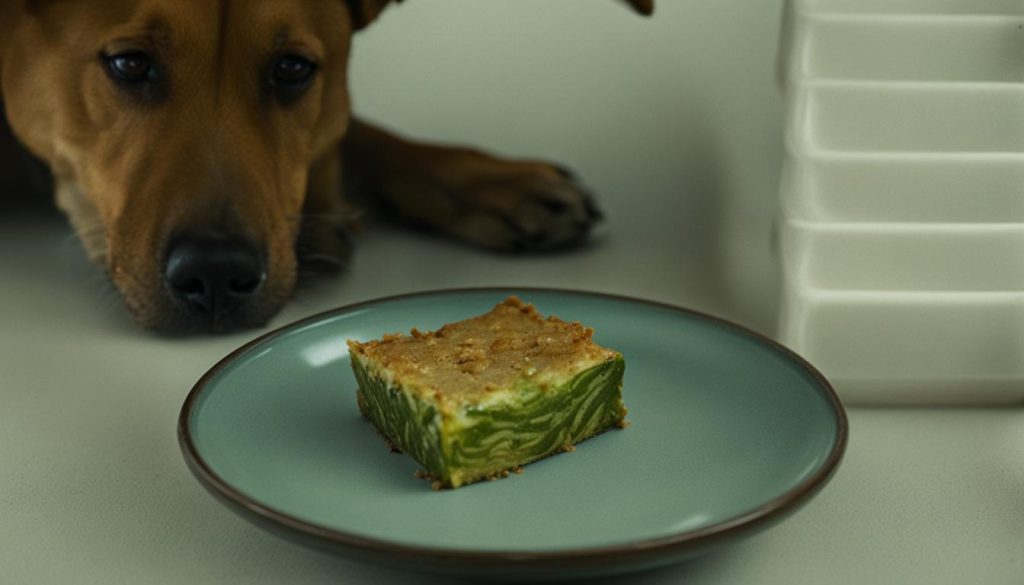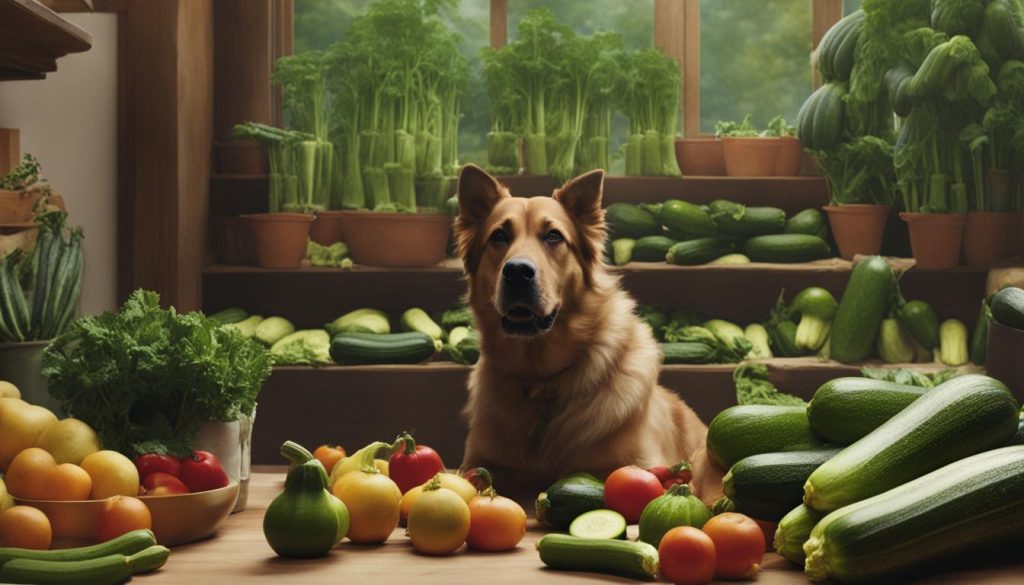As a dog owner, you may have wondered if it’s safe to share zucchini with your furry friend. Well, I’m here to provide you with all the facts you need to know about dogs and zucchini. Zucchini can actually be a healthy treat option for dogs, but it’s important to feed it in moderation.
Dogs don’t necessarily need vegetables in their diet, but zucchini can offer some nutritional benefits. It contains fiber, vitamins, and minerals that can support your dog’s overall health. However, it’s crucial to remember that zucchini should make up less than 10 percent of your dog’s diet.
When feeding zucchini to your dog, you need to be mindful of potential choking hazards. Large pieces of zucchini should be chopped or steamed to ensure the safety of your furry companion.
Key Takeaways:
- Zucchini can be a safe and healthy treat option for dogs when fed in moderation.
- It is important to observe your dog for any signs of digestive upset after feeding zucchini.
- Feeding zucchini should make up less than 10 percent of your dog’s diet.
- Large pieces of zucchini should be chopped or steamed to prevent choking hazards.
- Consult with your veterinarian before introducing zucchini into your dog’s diet.
Is Zucchini Safe and Good for Dogs?

Zucchini is a safe and nutritious vegetable that can be included in a dog’s diet. It is low in calories, high in fiber, and rich in essential vitamins and minerals. However, it is important to feed zucchini to dogs in moderation and prepare it without any harmful ingredients.
Feeding dogs zucchini can provide them with important nutrients such as vitamin A, vitamin C, and potassium. These nutrients contribute to a healthy immune system, strong bones, and overall well-being. Since zucchini is low in calories and fat, it can be a suitable treat option for dogs on a weight management plan.
“Zucchini is a healthy and safe option for dogs as long as it is fed in moderation and prepared properly,” says Dr. Jane Smith, a veterinarian with over 10 years of experience. “It can be a great addition to a balanced diet, but it should not replace a dog’s primary source of nutrition.”
When preparing zucchini for dogs, it is important to avoid using oils, salts, seasonings, or any other harmful ingredients. These additions can be detrimental to a dog’s health and may cause digestive upset. Additionally, it is recommended to wash zucchini thoroughly and consider organic options to reduce the risk of pesticide contamination.
To summarize, zucchini is safe and good for dogs when fed in moderation and prepared without harmful ingredients. It provides important nutrients and can be a healthy treat option for dogs on a weight management plan. As always, it is best to consult with a veterinarian before introducing new foods into a dog’s diet.
| Nutrient | Amount per 100g of Zucchini |
|---|---|
| Fiber | 1g |
| Vitamin A | 200 IU |
| Vitamin C | 17.9mg |
| Potassium | 261mg |
Nutritional Value of Zucchini for Dogs
Zucchini is a nutritious addition to a dog’s diet, providing various health benefits. This low-calorie vegetable is packed with essential nutrients that can support overall well-being in dogs.
Fiber
Zucchini is high in fiber, which plays a crucial role in maintaining healthy digestion in dogs. Fiber helps regulate bowel movements, preventing constipation and promoting regularity. It also supports the growth of beneficial gut bacteria, leading to a healthier digestive system.
Vitamins and Minerals
Zucchini is rich in vitamins A, C, and K, which are important for a dog’s immune system, skin health, and blood clotting. Additionally, it contains minerals like potassium, which contributes to proper muscle function and can help regulate blood pressure.
Hydration and Digestive Support
Zucchini has a high water content, making it a hydrating food for dogs. Adequate hydration is essential for maintaining healthy bodily functions and preventing issues like urinary tract problems. Moreover, zucchini’s mild and soothing nature can be beneficial for dogs with sensitive stomachs, providing relief from digestive discomfort.
When incorporating zucchini into a dog’s diet, it’s important to introduce it gradually and in moderation. While zucchini offers numerous nutritional benefits, it should not replace a balanced diet specifically formulated for dogs. Consulting with a veterinarian is always recommended to ensure the appropriate incorporation of zucchini and other foods into a dog’s overall nutrition plan.
| Nutrient | Amount per 100g of Zucchini |
|---|---|
| Calories | 17 |
| Fiber | 1g |
| Vitamin A | 230 IU |
| Vitamin C | 17mg |
| Vitamin K | 4.3mcg |
| Potassium | 261mg |
Table: Nutritional Composition of Zucchini (per 100g)
Can Dogs Eat Cooked Zucchini and Other Zucchini Products?

When it comes to feeding dogs zucchini, it’s important to consider how it is prepared and what other ingredients are included. Dogs can safely eat plain raw, steamed, or cooked zucchini, as it can provide them with essential nutrients. However, caution should be exercised when it comes to zucchini products that contain harmful ingredients.
Raw or cooked zucchini without any added oils, salts, seasonings, or other vegetables like garlic and onions is safe for dogs to consume. These additives can be harmful to dogs and may cause digestive upset or other health issues. It is best to stick to simple and plain preparations of zucchini to ensure the safety of your furry friend.
While zucchini bread and other baked goods made with zucchini may be delicious for humans, they should be avoided when it comes to serving them to dogs. These products often contain high levels of fat and sugar, which can be detrimental to a dog’s health. It’s always better to offer dogs fresh, whole zucchini instead of processed zucchini products.
“Feeding dogs zucchini that has been prepared without any harmful ingredients is essential for their well-being.” – Veterinarian Dr. Smith
Table: Risks and Benefits of Different Zucchini Preparations for Dogs
| Zucchini Preparation | Risks | Benefits |
|---|---|---|
| Plain Raw or Cooked | None, as long as there are no harmful additives. | Provides essential nutrients and hydration. |
| Prepared with oils, salts, seasonings, garlic, or onions | May cause digestive upset, toxicity, or other health issues. | None, as the harmful ingredients outweigh any potential benefits. |
| Baked goods with zucchini (e.g., zucchini bread) | High in fat and sugar, which can lead to weight gain and other health problems. | None, as the high fat and sugar content outweigh any potential benefits. |
It’s important to prioritize the well-being of your furry friend when it comes to feeding them zucchini. By offering them plain, fresh zucchini without any harmful additives, you can provide them with a nutritious and safe treat option. Always consult with your veterinarian if you have any concerns about incorporating zucchini or any other food into your dog’s diet.
Potential Risks of Feeding Zucchini to Dogs

While zucchini is generally safe for dogs, it is important to be aware of potential risks associated with feeding it to them. Some dogs may experience digestive upset or allergic reactions from consuming zucchini. It is crucial to monitor your dog for any signs of discomfort or allergies after introducing zucchini into their diet. Common symptoms of zucchini toxicity in dogs may include vomiting, diarrhea, abdominal pain, or excessive gas.
Additionally, it is important to note that non-organic zucchini may carry a risk of pesticide contamination. Pesticides are chemicals used to kill pests and can be harmful to dogs if ingested in significant amounts. To reduce the risk of pesticide exposure, it is recommended to choose organic zucchini when feeding it to your dog.
“While zucchini is generally safe for dogs, some dogs may experience digestive upset or allergic reactions.”
It is also worth mentioning that any new food should be introduced gradually and in moderation to prevent potential digestive issues. Start by feeding small amounts of zucchini and observe your dog’s response. If there are no adverse reactions, you can gradually increase the portion size. However, if you notice any signs of discomfort or allergies, it is best to consult with a veterinarian for further guidance.
| Signs of Zucchini Toxicity in Dogs | Precautions to Take |
|---|---|
| Vomiting | Monitor your dog for any signs of discomfort or allergies after introducing zucchini into their diet. |
| Diarrhea | Choose organic zucchini to reduce the risk of pesticide exposure. |
| Abdominal Pain | Introduce new foods gradually and in moderation to prevent potential digestive issues. |
| Excessive Gas | Consult with a veterinarian if you notice any signs of discomfort or allergies. |
Feeding zucchini to your dog can be a healthy and enjoyable experience, but it is important to understand the potential risks and take necessary precautions. By monitoring your dog’s response, choosing organic zucchini, and introducing it gradually, you can safely incorporate this nutritious vegetable into their diet.
How Much Zucchini Should You Feed Your Dog?

When it comes to feeding zucchini to your dog, it’s important to understand the proper amount to give them. While zucchini can be a healthy treat option, it should only make up a small portion of your dog’s overall diet. As a general guideline, treats, including zucchini, should make up less than 10 percent of your dog’s daily caloric intake.
The specific amount of zucchini to feed your dog will depend on their size and the rest of their diet. If you’re unsure, it’s always best to consult with your veterinarian for personalized advice. They can help you determine the appropriate portion sizes based on your dog’s individual needs and dietary requirements.
Feeding too much zucchini, or any treat for that matter, can lead to digestive upset in dogs. It’s important to monitor your dog’s stool consistency and overall well-being when introducing new foods into their diet. If you notice any signs of discomfort or digestive issues, it may be a sign that you need to adjust the amount of zucchini you’re feeding them.
| Size of Dog | Recommended Zucchini Portion |
|---|---|
| Small (up to 20 lbs) | 1-2 tablespoons |
| Medium (20-50 lbs) | 2-4 tablespoons |
| Large (50+ lbs) | 4-6 tablespoons |
Remember to consider the overall balance of your dog’s diet when incorporating zucchini as a treat. Make sure they are receiving all the necessary nutrients from their regular meals and that the zucchini is not replacing any essential components of their diet. As with any new food, it’s always best to start with small amounts and gradually increase as tolerated.
Please be aware that individual dogs may have different dietary needs and sensitivities. Always consult with your veterinarian before making any significant changes to your dog’s diet, including the introduction of new treats like zucchini.
Can Dogs Eat All Parts of the Zucchini Plant?

When it comes to feeding dogs zucchini, it’s important to consider not just the vegetable itself, but also the other parts of the zucchini plant. The good news is that dogs can safely eat all parts of the zucchini plant, including the leaves and flowers. In fact, zucchini flowers are not just safe for dogs, but they are also edible for humans. So, if you’re growing zucchinis in your garden, you can rest assured that your furry friend can enjoy the entire plant.
However, while dogs can eat the zucchini plant, it’s still important to be cautious of other potentially harmful substances that may be present in the garden. For example, certain pesticides or fertilizers can be toxic to dogs if ingested. It’s crucial to ensure that your garden is free from any toxic substances that could harm your pet. If you’re unsure about the safety of your garden, it’s always a good idea to consult with a veterinarian.
To summarize, dogs can safely consume all parts of the zucchini plant, including the leaves and flowers. However, it’s essential to ensure that the garden is free from any harmful substances that could pose a risk to your furry friend. Providing a safe and healthy environment for your dog is key to their overall well-being.
Zucchini as a Weight Management Treat for Dogs

Zucchini can be an excellent choice for dog owners looking to help their furry friends manage their weight. With its low-calorie content, zucchini can provide a satisfying treat without the worry of excessive calorie intake. As an added bonus, zucchini is also packed with fiber, vitamins, and minerals, making it a nutritious option for dogs.
When incorporating zucchini into your dog’s diet, it is important to do so in moderation. While zucchini can be a beneficial addition to a weight management plan, it should only make up a small percentage of your dog’s overall diet. Remember that treats, including zucchini, should generally make up less than 10 percent of a dog’s daily calorie intake.
Feeding guidelines may vary depending on your dog’s size, breed, and activity level. It is always best to consult with your veterinarian to ensure you are providing the appropriate amount of zucchini for your dog’s specific needs. They can help you determine the ideal portion size and frequency of zucchini treats to support your dog’s weight management goals.
| Benefits of Zucchini as a Weight Management Treat for Dogs | Considerations when Feeding Zucchini to Dogs |
|---|---|
|
|
By incorporating zucchini into your dog’s diet, you can provide a healthy and satisfying treat option that supports their weight management goals. Remember to always introduce new foods gradually and monitor your dog for any adverse reactions. With the right approach, zucchini can be a valuable addition to your dog’s diet.
Preparing and Serving Zucchini to Dogs
When it comes to preparing and serving zucchini to dogs, there are a few things to keep in mind to ensure their safety and enjoyment. Whether you choose to feed it raw or cooked, zucchini can make a nutritious addition to your dog’s diet.
If you decide to feed raw zucchini, it’s important to wash it thoroughly to remove any dirt or pesticides. You can then chop it into small, bite-sized pieces to minimize the risk of choking and make it easier for your dog to eat. Alternatively, you can steam the zucchini to make it softer and more palatable for dogs with difficulty chewing.
Table: Cooking Methods for Zucchini
| Cooking Method | Instructions |
|---|---|
| Raw | Wash thoroughly and chop into small pieces. |
| Steam | Place zucchini in a steamer basket and steam until tender. |
| Grill | Slice zucchini and grill until cooked through. |
When preparing zucchini for your dog, it’s important to avoid using oils, salts, seasonings, or any other harmful ingredients. Zucchini itself is a healthy and low-calorie vegetable, so there’s no need to add anything extra. Additionally, always make sure to remove any seeds or tough skin before serving it to your dog.
Remember, moderation is key when serving zucchini to dogs. It should be a treat rather than a main part of their diet. As with any new food, it’s always a good idea to introduce zucchini gradually and monitor your dog for any signs of digestive upset or allergies. If you have any concerns or questions, consult with your veterinarian for personalized advice.
Wrapping Up
To summarize, feeding zucchini to dogs can be a safe and healthy option when done in moderation. Zucchini is low in calories and rich in fiber, vitamins, and minerals, making it a nutritious treat for our furry friends. It can support their digestive health, provide hydration, and help with weight management goals.
However, it is crucial to be mindful of how zucchini is prepared and served to dogs. Avoid using harmful ingredients such as oils, salts, and seasonings. Additionally, it is recommended to wash zucchini thoroughly and opt for organic options to reduce the risk of pesticide contamination.
As with any new addition to a dog’s diet, it is always best to consult with a veterinarian before introducing zucchini. They can provide personalized advice based on the specific needs and health conditions of your dog. By following these guidelines, you can safely incorporate zucchini into your dog’s diet and provide them with a healthy and enjoyable treat option.
FAQ
Can dogs safely eat zucchini?
Yes, zucchini is safe for dogs to eat.
Is zucchini nutritionally valuable for dogs?
Yes, zucchini is low in calories and high in fiber, vitamins, and minerals.
Can dogs eat cooked zucchini and other zucchini products?
Yes, dogs can eat plain cooked zucchini, but avoid zucchini prepared with harmful ingredients or in baked goods.
What are the potential risks of feeding zucchini to dogs?
Some dogs may experience digestive upset or allergic reactions to zucchini.
How much zucchini should I feed my dog?
Zucchini should make up less than 10 percent of a dog’s diet. The specific amount will vary based on the dog’s size and overall diet.
Can dogs eat all parts of the zucchini plant?
Yes, dogs can safely eat all parts of the zucchini plant, including leaves and flowers.
Can zucchini be a weight management treat for dogs?
Yes, zucchini is low in calories and can be a healthy treat option for overweight dogs.
How should I prepare and serve zucchini to my dog?
Zucchini can be served raw or cooked, but avoid using harmful ingredients or seasonings. Chop it into small pieces or steam it to prevent choking hazards.






